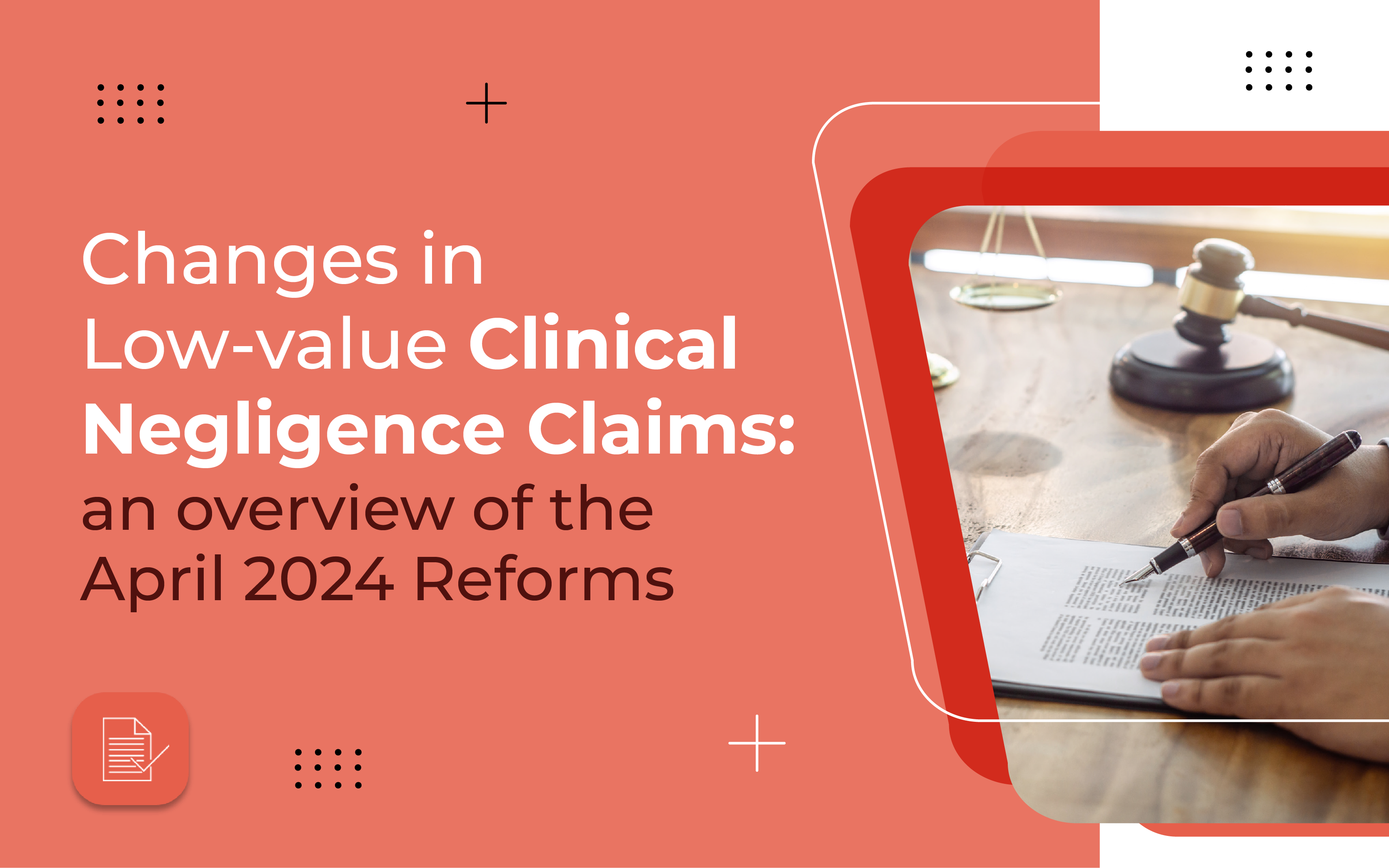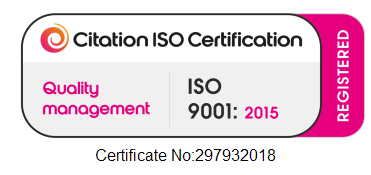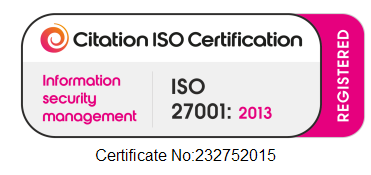
5 Mar 2024
Changes in low-value clinical negligence claims: an overview of the April 2024 Reforms
In the constantly evolving legal landscape, notable amendments are set to roll out in April 2024 which promise to reshape the framework for low-value clinical negligence claims.
These impending changes relate to the evolution of fixed recoverable costs (FRC), and we are here to shed light on their complexities, delving into the latest disclosure rules scheduled to take effect in the upcoming months.
Understanding fixed recoverable costs
FRCs have been integral to the legal framework governing fast-track claims in England & Wales since 2013, where they were initially introduced for personal injury damages below £25,000.
They are predetermined and fixed legal costs that parties can recover or be liable for in certain types of civil claims, and aim to streamline the legal process and bring predictability to costs in personal injury cases.
Over the years FRCs have undergone multiple changes, and the upcoming April 2024 reforms will extend their reach to a broader spectrum of civil claims.
Latest disclosure rules
Amongst the changes, the April 2024 update to the Civil Procedure Rules (CPR) introduces adjustments to disclosure requirements. This was triggered by a request for clarification from Thompson Reuters, the amendments address the default status of standard disclosure in personal injury claims.
The result is that rules 28.2(4) and 31.5(1) are set to be removed, leaving the disclosure landscape in claims involving personal injuries unclear, and The Ministry of Justice's response indicates that the changes aim to provide clarity regarding the application of rule 31.5 across different case management tracks.
Parties' agreement to disapply FRC
Effective April 6th 2024, parties engaged in settlement discussions will gain the flexibility to agree to disapply FRCs as part of their resolution, and whilst parties generally do have the freedom to negotiate settlement terms, the previous rule 45.1(3) created potential restrictions on costs in FRC claims.
This change introduces a degree of freedom for parties to tailor settlements to their specific circumstances, as it now explicitly allows parties to agree on costs without being bound by fixed costs, as long as both parties expressly waive the application of FRCs.
Temporary respite for clinical negligence claims
The proposal to extend FRC to clinical negligence claims involves amendments to rule 26.9(10)(b), bringing a temporary respite for personal injury lawyers.
Effective April 2024, these amendments clarify that a clinical negligence claim can only be allocated to the intermediate track if the Defendant admits liability in the letter of response.
Whilst the broader application of FRC to clinical negligence claims may loom on the horizon, these amendments provide a momentary reprieve.
Navigating the changes in different tracks
In the Fast Track, changes to the disclosure rules and parties' ability to disapply FRC present business-as-usual scenarios, and cross-border injury claims will continue to follow established procedures, with the cause of action determining the application of 2023 FRC rules.
Whereas in the Intermediate Track, mid-value cross-border injury claims under the new FRC rules will come into play. Now, 4 complexity bands have been introduced, meaning that these claims, valued at more than £25,000, will become subject to the extended FRC scheme.
This represents a departure from the previous scheme, where such claims were subject to hourly rate recovery in the multi-track.
And finally we have the Multi-Track, where claims of higher value arising before the 2023 FRC extension will remain outside the scope of the new provisions, and costs in these cases will be determined based on work done and guideline hourly rates.
But, is all really clear?
Despite the detailed rules, certain aspects of the changes remain open to interpretation and may need further clarification through test litigation.
This debate around the scope of FRC, exceptional circumstances for exemption and decisions about complexity bands continues to unfold, and whilst a revision to allow ‘contracting out’ of FRC is on the horizon, stakeholders must still navigate the uncertainties with caution.
As we approach the April 2024 reforms, the legal landscape for low-value clinical negligence claims will undergo significant transformations. As always, the legal journey continues, and April 6th 2024 deadline marks a pivotal point in the evolution of low-value clinical negligence claims.
Why Speed Medical are the preferred choice for clinical negligence case handling
Utilising our in-house medical and legal expertise, and by assigning a dedicated case handler to each client, Speed Medical has been delivering a unique reporting service for all clinical negligence cases and services for over 25 years.
Our clinical negligence reporting service is delivered through a nationwide panel of over 2,200 credible experts and is further supported by both our Clinical Advisory Board and dedicated case handlers, all developed and overseen by our in-house clinical negligence lawyer.
What’s more, our transparent pricing structure allows us to provide deferred payment terms as part of an industry leading approach. This includes our case handlers providing the CV's of up to 3 medical experts along with their estimated fees and turnaround times, within 5 working days of being instructed, as well as an expanded service which includes 2 levels of fixed fee preliminary screening reports, from any expert specialty; a service which has been created to enable solicitors to determine the viability of a case from the outset, without significant financial investment.
All of this combined makes Speed Medical the ideal choice for solicitors looking to instruct an established, leading provider of medical assessments, medical treatment, and medical reports.
How Speed Medical will assist in your FRC cases
Our reporting services will be of great value to solicitors navigating through the challenges and opportunities presented by the implementation of FRC’s.
- Streamlined Medical Assessments: Speed Medical will efficiently coordinate all medical assessments for your case within the FRC timescales. This will save fee earners valuable time searching for appropriate experts and negotiating fees.
- Faster Turnaround Times: We have an established network of over 5000 medical professionals, 2200 specialising in clinical negligence, which allows quicker turnaround times for medical reports. This expedites case progression and can help fee earners meet tighter FRC deadlines.
- Cost Control/ Transparency: By partnering with us, clients can better control and predict the costs associated with obtaining medical reports, which is crucial for adhering to FRC limits.
- Fixed Fee Screening: We have a streamlined process for fixed fee screening reports. Solicitors will be able to obtain a short form report, produced using a nominal number of pages and provided within 14 or 28 days of instruction. Greatly assisting with the introduction of tighter timeframes on FRC cases.
- Focus on Core Legal Work: For our clients, outsourcing medical reporting will allow fee earners to focus on their core legal work, such as client representation, case strategy, and negotiation.
For more information, please visit www.speedmedical.com, contact our team via email at commercialsupport@speedmedical.com or call us directly on 0330 094 8749.






